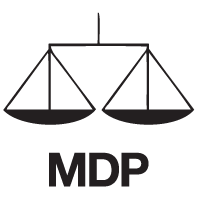The Maldivian Democratic Party (MDP) expresses grave concern at yesterday’s Supreme Court verdict in the Suo Moto case it initiated against the Human Rights Commission of the Maldives (HRCM) for its Universal Periodic Review submission in September 2014. The MDP believes this verdict, an 11-point guideline issued by the Supreme Court, effectively undermines the independence and mandate of the Human Rights Commission as stipulated in the constitution and as prescribed by the Paris principles.
In an overreaching trial, which took place over just three hearings, the Supreme Court declared that the HRCM’s submission to the UPR contained statements about the Supreme Court’s relationship with the lower courts, which was ‘devoid of fact and undermined its supervisory jurisdiction.’ In addition to undermining Article 189 of the constitution which outlines the mandate of the HRCM, it calls into question the role of an elected Parliament, which oversees the mandates of these independent commissions. The MDP expresses concern at the Supreme Court’s declaration that independent institutions’ concerns over issues in the Maldivian judiciary are tantamount to treason. According to media reports, this new Supreme Court issued guideline as a response to the HRCM’s UPR submission, orders the HRCM to uphold Maldivian values, faith, national unity and the rule of law while carrying out their work, implying that the questioning of judicial misconduct is a violation of these principles. The MDP is also concerned over the guideline’s undermining of the HRCM’s independence, when it calls for all HRCM communication with foreign parties to be directed via state channels.
At a time where international focus on the Maldives’ judiciary is at an all time high with the unlawful politically motivated charging, trial and sentencing of President Mohamed Nasheed and Col.Mohamed Nazim, and while Sheikh Imran Abdulla is on trial, the MDP believes this latest act by the Supreme Court is a further example of the country’s deteriorating human rights situation and that the judiciary is being used to eliminate the Government’s political opponents. The MDP notes the high number of member states who raised the issue of the Maldivian judiciary during the UPR session in Geneva in May of this year. Many of these member states – as well as the HRCM – put forward their recommendations based on the reports of the UN Special Rapporteur for Independence of Judges and Lawyers, Gabriella Knaul and the UN’s High Commissioner for Human Rights Zeid Ra’ad al Hussein. The MDP further notes that as an elected member of the UN Human Rights Council, a guideline by the country’s highest court undermining the institution, which also serves as the National Reporting Mechanism, is a diplomatic blight.
The Supreme Court guideline has been issued just as 3 new members –nominated by President Yameen – have been appointed to the HRCM by a ruling party led Majlis. All 3 members have serious links of political bias to the ruling Party and represents a further undermining of the HRCM’s independence.
The MDP’s International spokesperson, Hamid Abdul Ghafoor said,
‘The MDP is thankful that the members of the HRCM were at least spared a verdict outlining a jail sentence, unlike the Supreme Court’s action against the former members of the independent Election Commission in 2013. Yesterday’s verdict was another classic example of politically motivated judicial overreach in the Maldives, which has rendered the HRCM toothless.’
The Maldives Supreme Court’s involvement in undermining the constitution is of serious concern. In addition to annulling a free and fair election and issuing guidelines to statutory commissions, they also issued a circular just before President Nasheed’s politically motivated terrorism trial, reducing the appeal period from 90 to 10 days.
ENDS
